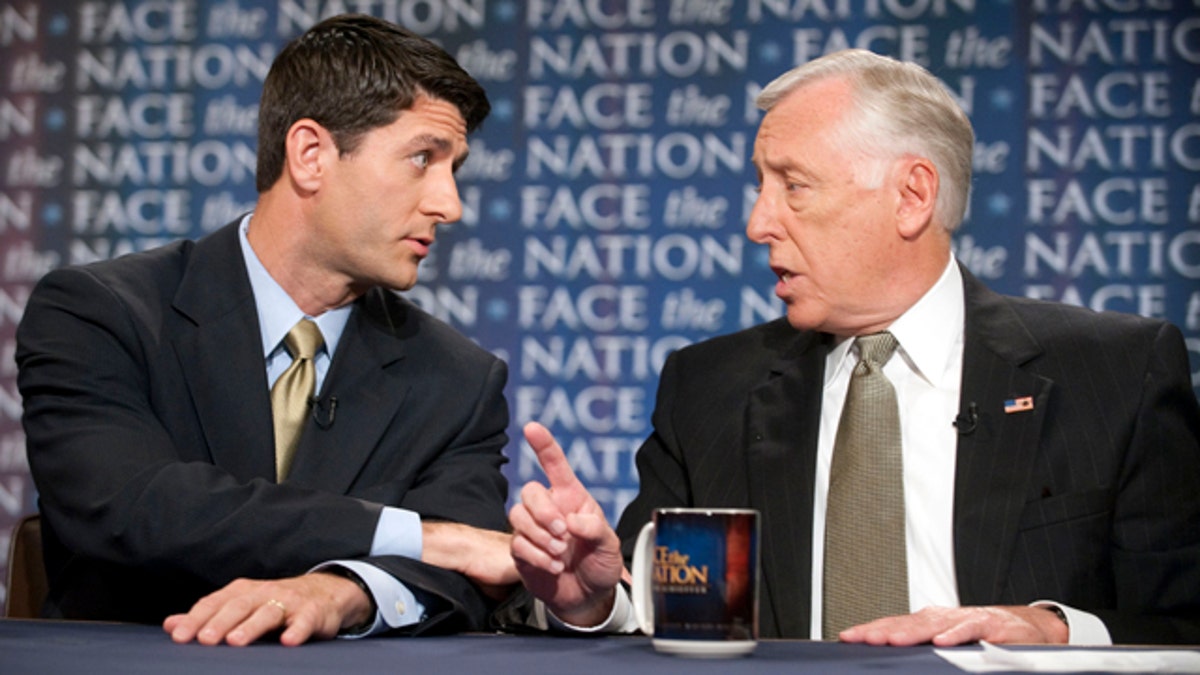
Sunday: House Budget Committee Chairman Paul Ryan, R-Wis., and House Democratic Whip Steny Hoyer, D-Md., discuss jobs and the economy. ((AP Photo/CBS, Chris Usher))
It was an example of one of the most vexing ways of Washington -- lawmakers from opposite sides of the aisle agreeing on the problem, but never reaching a solution.
As Congress prepares to return to Washington this week, Rep. Paul Ryan, R-Wis., the mastermind of the House GOP budget, and Rep. Steny Hoyer, D-Md., the No. 2 Democrat in the House, set about on Sunday morning to argue the finer points of Medicare and the country's economic treadmill.
It began with mutual agreement that debt reduction is critical to economic recovery. It then devolved into whether President Obama's 18-member debt commission, on which Ryan served, should have reached a deal last December when only 11 members supported the package. A supermajority of 14 was needed to forward the proposals to Congress. Ryan was among the seven who rejected the recommendations.
"Was it perfect? Nothing is perfect. But it certainly serves as a basis, I think, for bipartisan agreement," Hoyer said. "They did some very substantive work."
Congress wouldn't have been bound by the results had the debt commission reached its supermajority, but it could have been a template. When that didn't happen, President Obama offered a proposal that Republicans said did little or nothing to reduce debt.
Ryan then came up with an alternative plan -- heavily borrowing from the commission. It was rejected by Democrats, but passed the Republican-led House in April. The Democratic-led Senate refused to move on it, and the administration turned to Vice President Joe Biden to lead the budget negotiations.
Congress has been stuck there ever since.
But the good-natured lawmakers say they still get along.
"We need real leadership on this. Steny has exercised leadership, but not every Democrat is Steny Hoyer in the White House and in the Senate," Ryan said.
"Well, let me just ask both of you, the two of you are sitting here, you're both reasonable men, and you like one another," said Bob Schieffer, host of CBS' "Face the Nation," where the two men appeared.
"We do," Paul replied.
"That's correct," Hoyer said.
The men even agreed that the economy dove into a hole before President Obama entered office.
"Paul, you and I both know it's not realistic to say that the problem results from the last two years," Hoyer said.
"Yes," Ryan answered.
" ... And we had 3 million jobs lost in the last year of the Bush administration," Hoyer said.
"Absolutely. Let me agree with you, Steny, for a second. President Obama inherited a tough problem," Ryan said.
"Right," Hoyer said.
"No two ways about it. I'm not suggesting that's not the case," Ryan said.
And then, it turned back toward the inevitable -- agreeing, without ever really agreeing.
"(Deficit commission chairman) Erskine Bowles is saying lower tax rates," Ryan said.
"And, as you know, I agree with that," Hoyer replied.
"So we agree with that," Ryan said.
"But, no, you don't think that revenues ought to be any part of this component," Hoyer said.
"No, we think revenues should grow by growing the economy. And raising tax rates hurts economic growth," Ryan replied.
"Paul, with all due respect, that was your argument in 1981," Hoyer said.
"I was a kid in 1981," responded Paul, 41, as they laughed.
"Not your personal argument," said Hoyer. "Now, listen to me. That was the argument in 1981. That was the argument in 2001. And, both times, we had continuing large deficits."
"The difference today is we're putting up the spending cuts. The difference today is we're putting out the spending controls and the tax reform ..." Ryan interjected before the conversation again was consumed in cross talk.
"I can tell you want to get a word in," Ryan said as the two men laughed again.
In the end, however, it all came back to blame, and as it will be, party purity over personality.
"I think that the economic policies that the president has pushed through Congress and the law have made this recovery harder to sustain itself," Ryan said. "I think what he has done since then is to make matters worse, not better."
Hoyer responded that Ryan couldn't get "one conservative Democrat" to vote for the budget plan because it would not fulfill the promise to current seniors that they would see no change in their health care coverage.
"He repeals the Affordable Care Act. He repeals the wellness provisions, the benefits that are in there. He repeals the preventive benefits. And he repeals the help that we give to prescription drug for those in the doughnut hole," Hoyer said.
Ryan then argued that Republicans finally came around to a Democratic idea -- to change Medicare's payout system, similar to a proposal made by a Clinton-era commission led by former Louisiana Sen. John Breaux.
"I wonder who is being partisan about Medicare these days and who's not," Ryan said. "The mistake we made was we took an idea that used to be a Democratic idea, supported by Democrats in the 1990s, and we foolishly thought perhaps this was the start of bipartisan talks. And what we got was partisanship."




